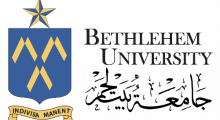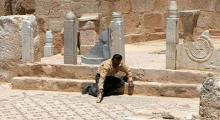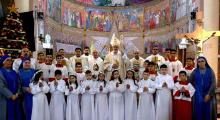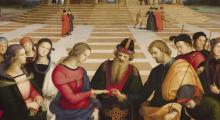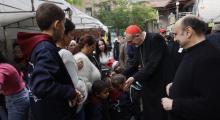Issued by the Catholic Center for Studies and Media - Jordan. Editor-in-chief Fr. Rif'at Bader - موقع أبونا abouna.org
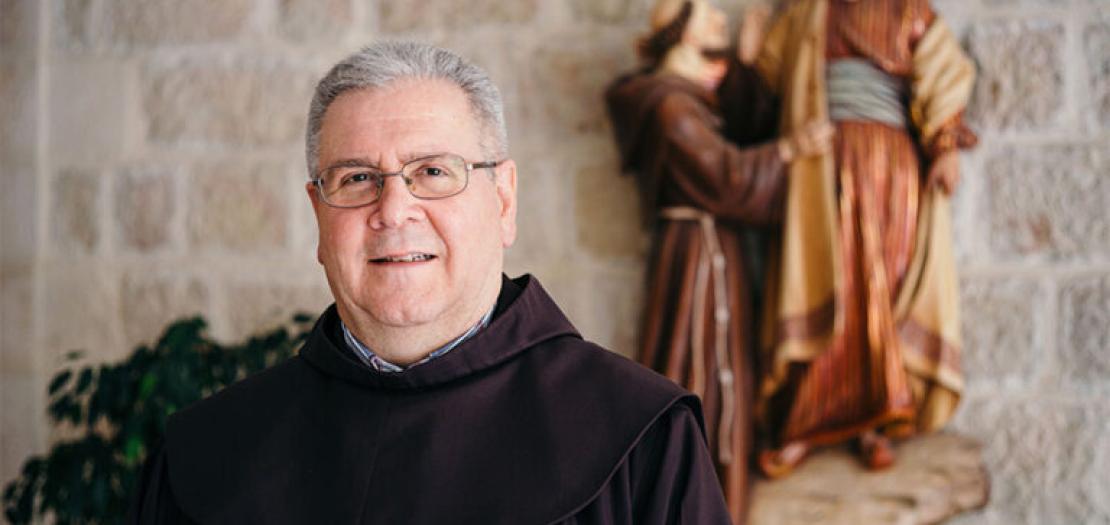
A brown habit and a backpack on his shoulders. A suitcase “always ready” for departure. This is how Fra Francesco Patton, Custos of the Holy Land, likes to describe his way of travelling and walking in this world, which until 2016 had only been a destination of a pilgrimage.
In the book-length interview “Like a Pilgrimage. My days in the Holy Land,” in bookshops from 10 January, published by Edizioni Terra Santa (with a preface by Pope Francis), and in a long interview with the media of the Custody, Fra Francesco relates his experience in this land and his nine years as Custos, as he is getting ready to conclude his term of office.
His first steps
Born in the valleys of the Trentino (Italy) and brought up in a family of a deep faith, Fra Francesco’s life was marked from a young age by his encounter with figures such as St Francis of Assisi and St Maximilian Kolbe, who inspired in him “a vocation of universal fraternity.” His appointment as Custos of the Holy Land, in 2016, came as a surprise. “I had never lived in the Holy Land, I had only been on a couple of pilgrimages. At the beginning, I was afraid of taking on this service,” he says. “I lived the first year like a novitiate, trying to get to know the friars, the situation of the Custody and the challenges of this land.” The support of the friars was fundamental: “They welcomed me as though I had always been here and they helped me join them.”
The spirituality of the Holy Places
The first mission of the Custody is to look after the Holy Places. “I used to know them on paper, now I know them first-hand,” says Fra Francesco, emphasizing the importance of living in the Holy Places, not only as Custos but as a believer: “I no longer had to imagine Calvary or the Tomb, as before. Celebrating in the Holy Places has meant a great deal for my personal experience of the faith.” Fra Francesco discovered the Holy Land as the place where “history and geography meet,” and a place which has transformed his spirituality: “I was further convinced of how strongly we Christians have to hold on to the historical dimension of the mystery of the Incarnation.” The places that “will remain inside me” include the basilicas of Nazareth, the Holy Sepulcher and the Nativity but also Capernaum and Tabgha, on the shore of the lake “where Jesus shared the life of simple people, where he did fraternal gestures and the scene of some very beautiful dialogues, like the one with Peter.” And Mount Nebo “because you can see far from there…”
Like a pilgrimage
The Custos describes his years in the Holy Land like a pilgrimage, a metaphor for life itself: “I think that it is important to get back the sense of life as a pilgrimage: inside the provisional nature of earthly life, we have a great outlook.” As St Francis always reminded his friars, “we are pilgrims and foreigners in this world” and St Paul adds that we are fellow citizens of the saints and relatives of God” and this is our destiny.
Travelling companions
In the nine years of his pilgrimage in the Holy Land, Fra Francesco has met many travelling companions. In the first place, the friars and those who have shared most closely with him the responsibilities for governance. Then some members of the staff of the Custody, including his secretary Diana, but also his chauffeur Shibli and Lurdinha, who have preceded him to Heaven. “Shibli was a brother to me. He was the one who taught me to celebrate Mass in Arabic.” With Lurdinha, one of the heads of the Christian Media Center, “there was a relationship of fraternity, friendship and sharing the mission of announcing the Gospel.” His relationship with the Greek Orthodox Patriarch Theophilos III, “a fraternal relationship of two believers called to dedicate their lives to God, who meet on the common ground of faith and the mission,” is also important.
Fraternity as a style of governance
“My experience of governance has always been that of making decisions in a participatory way. The more we are able to involve those who are part of our fraternity, the more the decisions will bear fruit, because when you feel involved, you also feel responsible.” It is the tradition of the Franciscan Order: “We have an instrument to share our decisions which is called the chapter. The basic idea is that governing does not put us in a position of power, but one of service. Being a Custos means being at the service of the Custody, the Custody is not at the service of the Custos.” Also, because, he summarizes with a quip, “Custodes come and go but the Custody remains!”
The challenges along the way
As on every pilgrimage, there were struggles, crises and times of difficulty. “When I arrived, the war in Syria was at its height. I was very concerned for the safety of the friars. I remember when I asked Fra Hanna Jallouf (today Vicar of Aleppo of the Latins) whether he wanted to leave Syria. He answered, ‘If I have to die, I prefer dying alongside my people, I am not a mercenary.’ His faith helped me to make a difficult decision with greater peace of mind.” With Covid, there came a significant problem of an economic nature. In the past year and a half, the war in Gaza, with the difficulty of not taking sides, or pronouncing judgements, but looking towards the future.
In these nine years, “I have seen a gradual involution of the Israeli political world” with “a right-wing that puts together a form of nationalist fundamentalism and a form of religious fundamentalism” emerging. As the Custody, “we have felt greater pressure, for example, on the question of taxes, the Holy Places have often been at the center of offensive or violent episodes, and cases of spitting at or insulting the friars have increased.” However, “I do not think that these things should upset us: the experience of eight centuries lets us remember that probably this is also a season that will pass.”
Following in the steps of St. Francis
In such a complex context, the way is shown by what St Francis told his friars and by his own example, when he met the Sultan. “St Francis teaches us to go towards the other with confidence, seeing the other as a brother and never as an enemy.” This is the contribution that the Custody also tries to make “through the schools, where we teach everyone to accept the other” and to have a fraternal attitude. “Fraternity produces something beautiful, peace produces something beautiful. We ought to cultivate this dream more.”
The Custody of tomorrow
What will the future of the Custody be like? “I imagine it in continuity with these eight centuries of presence in the Holy Land,” Fra Francesco continues. “We will always have to deal with a complex situation. About two thousand martyrs in eight centuries are an eloquent figure. We have faced up to epidemics, persecutions, changes of regime…”
“One of the things that I have most appreciated in these years is that the friars of the Custody still have the sense of the institution: they know that the Custody is not the reality of an individual friar, but a mission of the Order, confirmed by the Church with specific tasks. When there is the sense of the institution, the individual never prevails over “us” and we live well through the times of passage.”
Being missionaries and being international are the two pilasters that are fundamental: “It is very positive that there are friars who join the Custody directly from different countries, but I think it is necessary that the Custody preserves its identity of being ‘the mission’ of the Order,” Fra Francesco emphasizes. In the opinion of the Custos, “increasing importance will be given to the dimension of internationality and the consequence of the European component will decrease strongly. On the one hand, this is a challenge, on the other a possibility. We will have to work much more on formation.”
The flavor of these nine years
“They have been nine years of intensity from every point of view: spiritual, human, political and pastoral,” Fra Francesco says. When asked what the “flavor” of these nine years has been, the cooking enthusiast uses the image of the kubbeh, a typical Middle Eastern dish, “which has a crisp on the outside and a tender heart of meat.”


